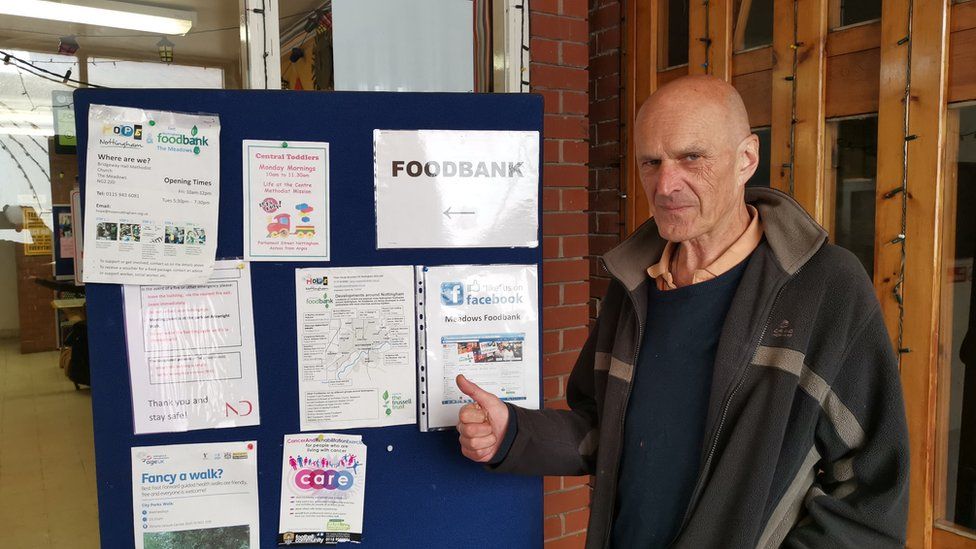Is Nottingham really the UK's 'poorest city'?
- Published

Nottingham has been named the UK's "poorest city" on a government list - the fifth time in seven years. The city council has again rejected the findings, saying many of its affluent suburbs are beyond the city's official boundaries. But outside a food bank on the Meadows estate, it's not hard to find people struggling to get by.
David Atkins, 58, has been unemployed for 19 years because of poor health and lives on Employment and Support Allowance (ESA).
He says the worst thing about having no money is the feeling of isolation. The past year has been particularly tough and he has built up £2,000 of debt.
He is now having to cut back to pay it off. Sometimes he goes a day or two without eating and some weeks he relies on the help of his friends because he has "absolutely nothing".
"It's horrible," he said. "Normal problems people deal with every day get exaggerated because you are at such a low point in your life."
Another person visiting the food bank is 53-year-old Maria Fern.
She admits she has rifled through supermarket bins at night to feed her and her son.
She says after her disability living allowance and benefits for caring for her son were cut, they now had to live on about £145 a week.
She said: "I feel embarrassed. I can't provide for my son, or buy his shoes or uniform. It's bad."
Their cases are unlikely to be isolated. According to figures released by the Office for National Statistics (ONS) Nottingham has the UK's lowest gross disposable household income - or GDHI.
Residents earn, on average, £12,445 a year after tax through jobs or benefits. Only Leicester has finished below Nottingham in recent years, in 2013 and 2014.
The city council rejects the findings and says a figure of £16,000 per person is more representative, once affluent suburbs such as West Bridgford are taken into account.
But many people are still struggling with poverty.
Walking past the food bank is Michael McHale, a 65-year-old retiree. He has lived in the city all his life but said he felt sorry for younger people now looking for jobs there.
"The figures don't surprise me when you think over the years how much industry we have lost in this city," he said.
"The Lace Market, where we used to make our famous lace, is now all just bars and accommodation for those that can afford it.
"All the large industries, like Raleigh bikes or the Player's cigarette factory who were paying good wages back in my day, have gone.
"What are the young people going to do? There's no work for them."
Melissa Levers, 29, from the Meadows, was also not surprised by the figures. She said "it's bloody hard to find a well-paying job round here", claiming those without a degree or looking for part-time work have very limited options in the city.
The mother-of-one and part-time carer added: "The wage we earn for what we do is ridiculous. I've stopped going out and buying make-up. I had to borrow money from my friend's grandad the other day - with food, bills and rent the pay is just not enough."
So is Nottingham really the UK's "poorest city"?
According to the figures residents earn more than £7,000 less than the national average. In comparison, people in nearby Leicester earn £12,560 while in Derby the figure is £14,556.
Further afield, the average earnings after tax in Birmingham are £14,128 while that figure is higher in Greater Manchester and Leeds - with residents taking home an average of £16,106 and £16,603 respectively.
However, Nottingham City Council - as it did last year - said the results have been skewed by geography.
A spokesman said: "This report comes out every year and nothing has changed since last year.
"As we said then, there are undoubtedly many low-income households in the city, but these statistics are a snapshot which doesn't reflect the reality for our resident population.
"That's because our city boundaries are tighter than most with many of Nottingham's suburbs sitting outside the city council boundary.
"More than half of the people who work in Nottingham City live in surrounding districts and including these areas gives a more meaningful figure of £16,000 per person, which would move Nottingham to 56th of the UK districts."
The ONS said the large student population in the city, with students from Nottingham Trent University and the University of Nottingham, may also have affected the results.
A spokesman said: "As with most local areas, we use the local authority boundary to define Nottingham in our statistics.
"While we can't put a figure on it, we think that Nottingham's high proportion of students in its population may be playing a role in pulling down its GDHI [gross disposable household income]."
Stella Howard, specialist service manager at Citizens Advice in Nottingham, said she had observed a deteriorating situation in the city over the past nine years, driven by welfare reform, unstable work and a rise in zero hours contracts.
She said: "When I started 20 years ago, a lot of what we were dealing with was credit card debt.
"Now we're dealing with a much higher proportion of priority debts. Council tax is the biggest one for us along with magistrates recovering TV licence debt. We're finding more and more that people are struggling to make essential payments.
"Nottingham's demographic definitely plays its part though. There aren't many affluent areas within the city boundaries."
Follow BBC East Midlands on Facebook, Twitter, or Instagram. Send your story ideas to eastmidsnews@bbc.co.uk.
- Published26 February 2019
- Published25 May 2018